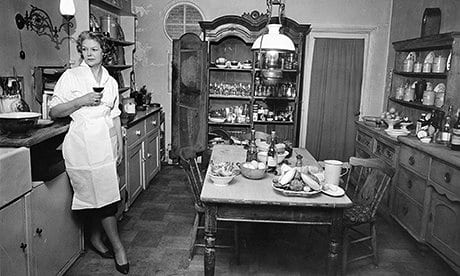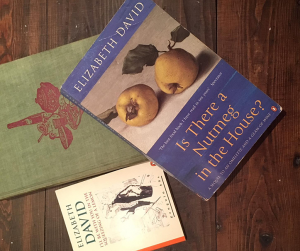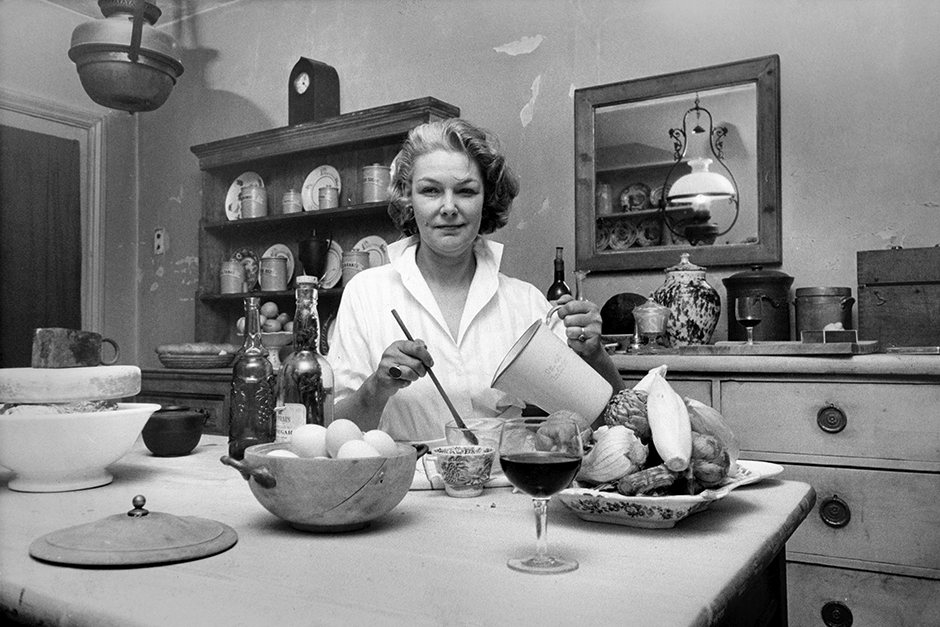WCW – Elizabeth David
I have a lot of cookbooks, so many cookbooks that they need their own collective noun (a Larousse of cookbooks perhaps?) but this was not always the case.

Growing up I remember only 4 cookbooks in the house. The first was a small blue index book, known as Granny’s book even though it didn’t belong to my Grandmother. It was where my Mum wrote recipes that she found or borrowed and was almost entirely useless to me. ‘Recipes’ as they were included a page entitled ‘Granny’s sponge’ underneath which was written; Make Mummy’s sponge, add gooseberry jam and some cream if you must. The second was of course Mrs Beeton’s Guide to Household Management, stolen I believe from the other Granny, and filled to the brim with helpful advice on how to properly fire ones third scullery maid. Again, not so helpful for a 12-year-old with a desire to cook. The third came with our new cooker, The Good Housekeeping ATAG Cookbook, and was useful. It had actual recipes in it, pictures that were neither hand drawn or abstract splodges. It was practical and no nonsense, as Good Housekeeping should be. Inspirational it was not.
The fourth was A Book of Mediterranean Food by Elizabeth David. A squat hardback, with a bright blue illustrated paper cover and swirly hand drawn font. There was sea and sunshine, sailing boats and overflowing platters of food. Bottles of wine and a palpable non-English flair. It was enticing.
I would pull it from the shelf and find myself reading recipes I didn’t understand, before returning to the safety of the ATAG to make a batch of brownies or a spag bol. But Elizabeth David kept calling to me. A year later, in my stocking for Christmas was a copy of I’ll be with you in the squeezing of a lemon a Penguin 60 collection of her writings and recipes. I was no longer enticed, I was hooked. In it she wrote about food in a way I’d never heard before, she talked about her time at 16 years old with a Parisian family, about learning the joys of risotto Milanese and about writing about food for Vogue magazine, the most glamorous career a greedy-style-obsessed-pre-teen could aspire to. I loved her a bit, and then I’m embarrassed to say, I forgot about her for a while.
Years later, when Nigella was writing for Vogue my mind wandered back to that other Vogue writer, Elizabeth David, and I started to discover what an incredible woman she was – the crush commenced.
 Elizabeth first started writing for Harper’s Bazaar and the writings and recipes from Mediterranean Food were taken from those Harpers articles, for which she had (oh so wisely) retained the copyright. So far so enlightened Europhile woman, but this was 1950! Most houses in Britain had never heard of a courgette and olive oil came from Boots and was the stuff you put in your ears if you were poorly. David, it turns out, was way ahead of her time. As a very posh young lady she was, as was the done thing, educated at a boarding school and then packed off to Paris to the Sorbonne in preparation for her presentation as a debutante, and presumably a suitable marriage. In Paris, she fell in love with the food, less with the art. She briefly became an actress, fell in love with an unsuitable man, travelled Europe with him, fell out of love, came home, despaired at the lack of food with passion in a drab post-war Britain and her food writing career began. She did have a marriage but didn’t behave very suitably in it. She travelled more, fell in love again (and again, and again). Her recipes were not necessarily pretty or perfect, and they were definitely not hand-holding, but she writes with passion and honesty that leaps off the page. In the recipe for Omelette Landaise in French Provincial Cookery she refers to it as “a rather odd dish, but not without charm” similarly in describing black pudding she says, “the usual variety to be bought in England are rather insipid”. I cannot imagine she endeared herself hugely to the average British housewife, a woman who travelled a lot, did what the bloody hell she wanted, had extramarital affairs and used ingredients they had never heard of. But she endeared herself to me, and my crush deepened.
Elizabeth first started writing for Harper’s Bazaar and the writings and recipes from Mediterranean Food were taken from those Harpers articles, for which she had (oh so wisely) retained the copyright. So far so enlightened Europhile woman, but this was 1950! Most houses in Britain had never heard of a courgette and olive oil came from Boots and was the stuff you put in your ears if you were poorly. David, it turns out, was way ahead of her time. As a very posh young lady she was, as was the done thing, educated at a boarding school and then packed off to Paris to the Sorbonne in preparation for her presentation as a debutante, and presumably a suitable marriage. In Paris, she fell in love with the food, less with the art. She briefly became an actress, fell in love with an unsuitable man, travelled Europe with him, fell out of love, came home, despaired at the lack of food with passion in a drab post-war Britain and her food writing career began. She did have a marriage but didn’t behave very suitably in it. She travelled more, fell in love again (and again, and again). Her recipes were not necessarily pretty or perfect, and they were definitely not hand-holding, but she writes with passion and honesty that leaps off the page. In the recipe for Omelette Landaise in French Provincial Cookery she refers to it as “a rather odd dish, but not without charm” similarly in describing black pudding she says, “the usual variety to be bought in England are rather insipid”. I cannot imagine she endeared herself hugely to the average British housewife, a woman who travelled a lot, did what the bloody hell she wanted, had extramarital affairs and used ingredients they had never heard of. But she endeared herself to me, and my crush deepened.

She wrote 8 food/recipe books between 1950 and 1984, as well as writing articles for numerous publications including Harpers Bazaar, Vogue and The Sunday Times amongst others. She contributed to a huge number of other books and 10 volumes were published posthumously from her writings. In later life, although she told very few people, she suffered an illness that affected her taste buds and so her passion became difficult to indulge. Apparently, it impacted her olfactory nerve so badly that the smell of frying onions was unbearable. I think I would have broken down and given up. She opened a shop instead. As with her writing, in commerce, she refused to compromise. She sold cooking equipment, but only that which she saw as right and appropriate. Her rant about garlic presses, reproduced in Is there a nutmeg in the house? is legendary. She describes them as ‘diabolical instruments’ and wonders why people don’t ‘forthwith throw the thing into the dustbin’.
 In my Larousse of cookbooks, I am embarrassed to say I only own a few Elizabeth David’s a fact which I will have to remedy immediately if not sooner. My Mum’s stash of cookbooks has also dwindled as I have been able to purloin the Mrs Beeton and the ATAG has been hidden in a box somewhere. Every time I visit I eye up Granny’s book in the hopes it will soon be mine, but the one I know the mothership will never part with is her Elizabeth David. I can only assume this is because my Mum gets the same joy I do from her books. I can flick to almost any page and find myself inspired, hungry and, more often than not, laughing.
In my Larousse of cookbooks, I am embarrassed to say I only own a few Elizabeth David’s a fact which I will have to remedy immediately if not sooner. My Mum’s stash of cookbooks has also dwindled as I have been able to purloin the Mrs Beeton and the ATAG has been hidden in a box somewhere. Every time I visit I eye up Granny’s book in the hopes it will soon be mine, but the one I know the mothership will never part with is her Elizabeth David. I can only assume this is because my Mum gets the same joy I do from her books. I can flick to almost any page and find myself inspired, hungry and, more often than not, laughing.
I would like to have had a glass of wine with her, preferably sitting at the table on the front of Mediterranean Food, looking at the sailing boats and listening to her talk and talk and talk about food. Elizabeth David, excellent food writer, woman before her time and, I like to think, probably excellent company over a glass of something.

